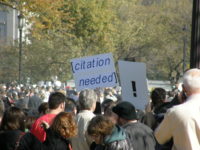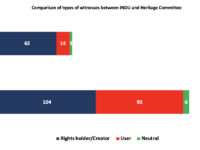The Broadcast and Telecommunications Legislative Review Panel released its interim report – What We Heard – yesterday alongside the long-overdue release of the written submissions to the panel. The report doesn’t contain any surprises given that the various positions on key telecom and broadcast issues are well known. While the panel is set to deliver its final report in January 2020, there is increasing reason to suspect that the government (if re-elected) has already decided what it wants to do.
Archive for June, 2019
Better Data, Better Results: Comparing the Gap Between the Copyright Review and Heritage Study on the Music Industry’s Policy Proposals
My recent series reviewing the Industry Committee’s copyright review (process, evidence, witness balance, citation) was about more that just why the decision to ignore the Canadian Heritage committee study on artist remuneration was justified. The series provides a data-backed assessment of the quality of the consultation of the respective committees, which is inextricably linked to their final recommendations. The better process is important because when comparing the recommendations from the two committees, the Industry committee consistently provided deeper analysis even in areas where there was agreement. The better analysis is not a coincidence: better process generates better policy and the Industry committee engaged in broader consultations in which it heard both from more creators and more users than Heritage.
Ignoring the Evidence: Why the Copyright Review Was Right To Ignore the Canadian Heritage Committee Study, Part Four
My series on why the Industry committee was right to ignore the Canadian Heritage committee study as part of the national copyright review has previously discussed process (the government vested sole responsibility with the Industry committee), an examination of the witness and brief list that confirms that Industry conducted a much more comprehensive consultation that overlapped with much of Heritage but also included hundreds of additional witnesses and briefs, and the (im)balance among witnesses which indicates that the Industry committee made a greater effort to hear a wide range of perspectives consistent with the diverse views on copyright.
The LawBytes Podcast, Episode 17: What To Do About Huawei? – Christopher Parsons Unpacks One of Canada’s Most Challenging Policy Issues
What to do about Huawei? The Chinese telecom giant has emerged as one of Canada’s most challenging policy issues, raising concerns involving competition, communications, security, and trade not to mention kidnappings and arrests of corporate personnel. The government has repeatedly promised to articulate a policy on the use of Huawei equipment in Canada’s next generation wireless networks only to regularly delay doing so. Dr. Christopher Parsons, a senior research associate at the Citizen Lab, the world-famous cyber-security lab located at the Munk School of Global Affairs and Public Policy at the University of Toronto, joins the podcast to help sort through fact from fiction when it comes to Huawei.
Unbalanced Witness List: Why the Copyright Review Was Right To Ignore the Canadian Heritage Committee Study, Part Three
My series on why the Industry committee was right to ignore the Canadian Heritage committee study as part of the national copyright review has focused on process (the government vested sole responsibility with the Industry committee, its clear assertion as the authoritative copyright review, and an examination of the witness and brief list that confirms that Industry conducted a much more comprehensive consultation that overlapped with much of Heritage but also included hundreds of additional witnesses and briefs.











